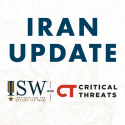China-Taiwan Weekly Update, February 28, 2025
Feb 28, 2025 - ISW Press
The Taiwanese Central Election Commission (CEC) approved recall votes for 19 Kuomintang (KMT) legislators, which could diminish the influence of the opposition parties in the Legislative Yuan (LY)










